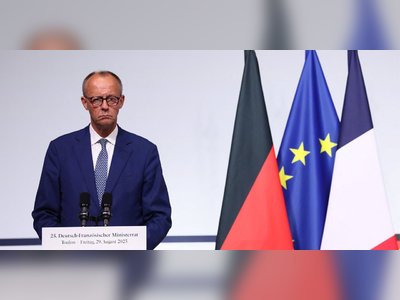Tech Giants Mobilize Against European Regulations with U.S. Administration's Backing
As American tech firms ramp up lobbying efforts against stringent European legislation, tensions rise ahead of key regulatory deadlines.
In recent weeks, major technology companies have intensified lobbying efforts against the new regulatory framework established by the European Union (EU) aimed at governing digital services.
This push comes amid a supportive stance from the newly established American administration under President Donald Trump, who has vocally criticized the EU's stringent regulations on U.S.-based tech companies.
The ongoing dispute has raised concerns about potential regulatory clashes between the U.S. and the EU, increasingly being characterized as a 'regulatory war'.
Over the past two years, the EU has successfully passed a series of comprehensive legislative measures designed to regulate technology.
The Digital Services Act (DSA), which took effect in August 2023, imposes a variety of obligations on platform operators and search engines.
Key provisions require companies to act against illegal content upon receiving orders, publish annual reports on content moderation efforts, conduct yearly systematic risk assessments, and implement emergency response mechanisms during crises.
The Digital Markets Act (DMA), effective March 2024, mandates that technology firms must limit how they use personal data, refrain from exclusivity on products or services offered to end users, allow third-party applications to be installed on their operating systems, and avoid prioritizing their own services over those of competitors.
Additionally, the EU's AI legislation, which came into force in August 2024, broadly regulates artificial intelligence applications.
This includes stringent prohibitions against using systems that manipulate human behavior or employ facial recognition for social scoring.
There are also significant restrictions on AI applications in healthcare, education, employment, law enforcement, and generative AI systems.
The primary burdens of these new regulations are largely placed on large technology companies, particularly American firms, which shoulder the most significant regulatory load.
For example, under the DSA, Meta is required to allow users to contest decisions impacting their content visibility, even if such content is not removed from platforms like Facebook or Instagram.
Amazon, on the other hand, has been compelled to facilitate warnings about illegal products on its platform and provide increased transparency about sellers.
The DMA has prompted Apple to enable application installations through independent app stores or developer websites, rather than solely relying on the App Store.
Additionally, Google is mandated not to excessively prioritize its own services in search results, a practice that has already resulted in substantial fines from the EU. Companies argue that the new AI laws have created uncertainty, delaying their rollout of AI systems and services in Europe.
Notably, Apple has postponed the launch of its Apple Intelligence system for iPhones and iPads until April, while Meta has declared it will refrain from releasing generative AI models in the EU.
With the Trump administration in place, tech giants are optimistic about leveraging these connections to mitigate the EU's strict regulations.
During the presidential campaign, Trump consistently criticized EU regulations, asserting that they create an unfair competitive environment for American companies.
Three days post-inauguration, Trump stated in a video address at the World Economic Forum in Davos that the fines levied by the EU on American companies exemplify a form of taxation.
He highlighted the substantial financial gains the EU has made from American corporations, arguing they should not be subject to such penalties.
U.S. Vice President J.D. Vance reinforced the administration's stance in a recent speech in Paris, expressing concerns over foreign governments tightening oversight on U.S. tech firms with international operations, declaring that America would not tolerate such actions.
Since Trump's victory in November, leading tech firms have shown increasing affinity and collaboration with the administration, hoping that these improved relations would galvanize governmental support in challenging EU regulations.
According to reports, tech giants are growing more confident in their ability to contest the new regulations, betting on backing from the White House.
Sources within Meta have indicated that the company has initiated efforts against the AI Act, aiming to dilute the legislation's practical applications.
Concurrently, they are pushing for limited enforcement of the Digital Markets Act, particularly in relation to avoiding hefty fines stemming from regulatory violations.
Recent strategies have yielded some outcomes; last week, the EU Commission withdrew its proposal for an AI liability directive, which would have mandated companies to pay for damages caused by their AI systems.
EU Vice President Vera Jourova stated that this decision aimed to promote AI investments and was not a reaction to pressure from American tech firms.
However, some EU officials perceive this move as a signal that legislative actions and enforcement could be adjusted in negotiations with Washington concerning tariffs and U.S. commitments to European security.
Another focal point of contention for the tech companies is the Digital Markets Act.
The EU Commission has opened investigations against Apple, Meta, and Google for potential violations of the law, which could result in fines up to 10% of their global revenue.
However, reports earlier this year suggested that the EU Commission was reconsidering the scope of these investigations, possibly reducing or terminating them following Trump's electoral win.
Simultaneously, the companies are seeking clarifications on the extent of enforcement and detailed guidelines on the limitations imposed by the law to facilitate weaker enforcement.
A key upcoming challenge for tech companies is the establishment of the EU's AI Code of Conduct, due for completion in April, which will dictate how businesses must comply with the AI Act.
Meta has already stated its intention not to agree to a voluntary code, with the company's policy director in Brussels declaring the code imposes 'unworkable and technically impossible requirements' and suggesting that without a transatlantic partnership, China may outpace the U.S. in AI innovation.
Efforts by tech giants have led to tangible adjustments; the EU Commission’s recent withdrawal from the AI liability directive is seen as a precursor to extensive negotiations over regulatory enforcement.
High-ranking officials inside the EU interpret this move as an opportunity for negotiations concerning tariffs, further indicating a rift in the implementation of the stringent regulations.
The ongoing regulatory landscape exemplifies a determined approach from the EU towards technology companies, reflecting a decade-long commitment to developing significant and precedent-setting measures to limit corporate power and enhance consumer protections.
As the EU faces the possibility of direct confrontation with a U.S. administration resolutely defending its tech companies, the implications of these regulatory endeavors will become increasingly complex, particularly in light of the potential responses from the Trump administration.
This push comes amid a supportive stance from the newly established American administration under President Donald Trump, who has vocally criticized the EU's stringent regulations on U.S.-based tech companies.
The ongoing dispute has raised concerns about potential regulatory clashes between the U.S. and the EU, increasingly being characterized as a 'regulatory war'.
Over the past two years, the EU has successfully passed a series of comprehensive legislative measures designed to regulate technology.
The Digital Services Act (DSA), which took effect in August 2023, imposes a variety of obligations on platform operators and search engines.
Key provisions require companies to act against illegal content upon receiving orders, publish annual reports on content moderation efforts, conduct yearly systematic risk assessments, and implement emergency response mechanisms during crises.
The Digital Markets Act (DMA), effective March 2024, mandates that technology firms must limit how they use personal data, refrain from exclusivity on products or services offered to end users, allow third-party applications to be installed on their operating systems, and avoid prioritizing their own services over those of competitors.
Additionally, the EU's AI legislation, which came into force in August 2024, broadly regulates artificial intelligence applications.
This includes stringent prohibitions against using systems that manipulate human behavior or employ facial recognition for social scoring.
There are also significant restrictions on AI applications in healthcare, education, employment, law enforcement, and generative AI systems.
The primary burdens of these new regulations are largely placed on large technology companies, particularly American firms, which shoulder the most significant regulatory load.
For example, under the DSA, Meta is required to allow users to contest decisions impacting their content visibility, even if such content is not removed from platforms like Facebook or Instagram.
Amazon, on the other hand, has been compelled to facilitate warnings about illegal products on its platform and provide increased transparency about sellers.
The DMA has prompted Apple to enable application installations through independent app stores or developer websites, rather than solely relying on the App Store.
Additionally, Google is mandated not to excessively prioritize its own services in search results, a practice that has already resulted in substantial fines from the EU. Companies argue that the new AI laws have created uncertainty, delaying their rollout of AI systems and services in Europe.
Notably, Apple has postponed the launch of its Apple Intelligence system for iPhones and iPads until April, while Meta has declared it will refrain from releasing generative AI models in the EU.
With the Trump administration in place, tech giants are optimistic about leveraging these connections to mitigate the EU's strict regulations.
During the presidential campaign, Trump consistently criticized EU regulations, asserting that they create an unfair competitive environment for American companies.
Three days post-inauguration, Trump stated in a video address at the World Economic Forum in Davos that the fines levied by the EU on American companies exemplify a form of taxation.
He highlighted the substantial financial gains the EU has made from American corporations, arguing they should not be subject to such penalties.
U.S. Vice President J.D. Vance reinforced the administration's stance in a recent speech in Paris, expressing concerns over foreign governments tightening oversight on U.S. tech firms with international operations, declaring that America would not tolerate such actions.
Since Trump's victory in November, leading tech firms have shown increasing affinity and collaboration with the administration, hoping that these improved relations would galvanize governmental support in challenging EU regulations.
According to reports, tech giants are growing more confident in their ability to contest the new regulations, betting on backing from the White House.
Sources within Meta have indicated that the company has initiated efforts against the AI Act, aiming to dilute the legislation's practical applications.
Concurrently, they are pushing for limited enforcement of the Digital Markets Act, particularly in relation to avoiding hefty fines stemming from regulatory violations.
Recent strategies have yielded some outcomes; last week, the EU Commission withdrew its proposal for an AI liability directive, which would have mandated companies to pay for damages caused by their AI systems.
EU Vice President Vera Jourova stated that this decision aimed to promote AI investments and was not a reaction to pressure from American tech firms.
However, some EU officials perceive this move as a signal that legislative actions and enforcement could be adjusted in negotiations with Washington concerning tariffs and U.S. commitments to European security.
Another focal point of contention for the tech companies is the Digital Markets Act.
The EU Commission has opened investigations against Apple, Meta, and Google for potential violations of the law, which could result in fines up to 10% of their global revenue.
However, reports earlier this year suggested that the EU Commission was reconsidering the scope of these investigations, possibly reducing or terminating them following Trump's electoral win.
Simultaneously, the companies are seeking clarifications on the extent of enforcement and detailed guidelines on the limitations imposed by the law to facilitate weaker enforcement.
A key upcoming challenge for tech companies is the establishment of the EU's AI Code of Conduct, due for completion in April, which will dictate how businesses must comply with the AI Act.
Meta has already stated its intention not to agree to a voluntary code, with the company's policy director in Brussels declaring the code imposes 'unworkable and technically impossible requirements' and suggesting that without a transatlantic partnership, China may outpace the U.S. in AI innovation.
Efforts by tech giants have led to tangible adjustments; the EU Commission’s recent withdrawal from the AI liability directive is seen as a precursor to extensive negotiations over regulatory enforcement.
High-ranking officials inside the EU interpret this move as an opportunity for negotiations concerning tariffs, further indicating a rift in the implementation of the stringent regulations.
The ongoing regulatory landscape exemplifies a determined approach from the EU towards technology companies, reflecting a decade-long commitment to developing significant and precedent-setting measures to limit corporate power and enhance consumer protections.
As the EU faces the possibility of direct confrontation with a U.S. administration resolutely defending its tech companies, the implications of these regulatory endeavors will become increasingly complex, particularly in light of the potential responses from the Trump administration.
AI Disclaimer: An advanced artificial intelligence (AI) system generated the content of this page on its own. This innovative technology conducts extensive research from a variety of reliable sources, performs rigorous fact-checking and verification, cleans up and balances biased or manipulated content, and presents a minimal factual summary that is just enough yet essential for you to function as an informed and educated citizen. Please keep in mind, however, that this system is an evolving technology, and as a result, the article may contain accidental inaccuracies or errors. We urge you to help us improve our site by reporting any inaccuracies you find using the "Contact Us" link at the bottom of this page. Your helpful feedback helps us improve our system and deliver more precise content. When you find an article of interest here, please look for the full and extensive coverage of this topic in traditional news sources, as they are written by professional journalists that we try to support, not replace. We appreciate your understanding and assistance.











